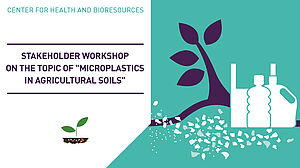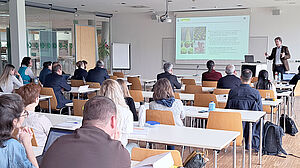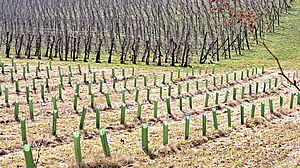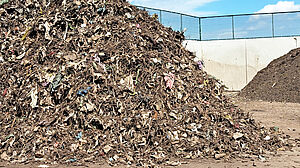The AIT-led NETmicroplastic project invited relevant stakeholders and interested members of the public to share their knowledge and ideas on the use of (micro)plastics in agriculture on April 27. The focus was on potential impacts on the environment and human health and on promoting innovation in the fields of classical polymeric and new materials.
NETmicroplastic is part of Lower Austria's RTI program, which aims to build thematic networks of critical size to incentivize research and development. Coordinator Claudia Preininger, Competence Unit Bioresources of the AIT Center for Health and Bioresources, hosted a full-day stakeholder workshop at AIT Tulln with 35 participants, 14 of whom represented the core NETmicroplastic network.
Microplastics in soil are plastic particles less than five millimeters in diameter that originate either from soil additives (e.g., fertilizers or coatings) or from the decay of larger plastic items, including plastic waste. In fact, we know little about the amount of microplastics that end up in the soil and where they come from, or the risks to the environment and human health. NETmicroplastic takes a closer look at the impact of plastic in the environment, with special attention to the soil-plant-food nexus, and looks for new technologies and alternatives to the potentially harmful plastic materials currently in use.
Social acceptance is essential
In her welcoming speech, C. Preininger affirmed that stakeholder involvement is key to the success of NETmicroplastic. Many different stakeholder groups need to work together to find answers and solutions to the problem area of "microplastics in soil", and for new strategies to gain broad acceptance in society. In its core NETmicroplastic network (with participants from Austria, Germany, Spain and the Netherlands), the AIT Competence Unit Bioresources team links basic and applied research with policy and society, the agrochemical industry, agriculture and the education sector. Although NETmicroplastic is designed to run for three years, the network is expected to last and grow beyond the project period.
New polymer materials are needed
The workshop program reflected the many facets of NETmicroplastic, with a focus on fruit and wine production and composting. Keynote presentations were given by Martin Löder, University of Bayreuth, on "Microplastic contamination in soil: Analytical Methods and the Role of Organic Fertilizers" and by Friedrich von Hesler, Novamont, on "Biodegradable Mulch Film: Properties, Applications and Challenges in Marketing." Other presentations addressed the occurrence of microplastics in agriculture, including plastic emissions and tire wear, the use of plastics in viticulture and fruit growing, and the use of biopolymers in plastic products. In addition, there were reports on field trials and surveys on the occurrence of microplastics.
After visiting the composting plant of Brantner Österreich GmbH Krems-Gneixendorf, the workshop participants exchanged views in a World Café on the NETmicroplastic focus topics "Technology", "Environment" and "Education" in relation to microplastics in soil. It became clear that linking the environment and technology is crucial if we are to develop viable and sustainable solutions. Regarding the properties of plastics, it was considered important to evaluate bioplastics as critically as conventional plastics in terms of their degradability in soil and their biological impact. It was emphasized that new polymeric materials need to be developed that can one day replace poorly degradable materials in fertilizers, seed coatings, and plastic products as used in agricultural practices. There was agreement that we need to raise awareness about microplastics and more generally about preserving soil health.
Ongoing surveys
The results of the workshop will feed into a stakeholder mapping exercise that the network is currently conducting. Other activities include an ongoing survey of university students from various disciplines and two further planned surveys of farmers and (bio)plastics producers, respectively. In addition, the results of the workshop will help to determine the direction of further research and should provide impetus for education and teaching.
NETmicroplastic‘s core network partners:
- AIT Austrian Institute of Technology GMBH (AIT), Austria
- HBLA und Bundesamt Klosterneuburg Wein- und Obstbau
- WasserCluster Lunz
- University of Natural Resources and Life Sciences / IFA Tulln
- Agricultural chamber of Lower Austria (LK NÖ)
- Environment Agency Austria (UBA)
- Institut für Umwelt & Energie, Technik & Analytik e.V. (IUTA)
- Wageningen University & Research
- Bündnis Mikroplastikfrei
- Aimplas
- European Bioplastics
- Purency






